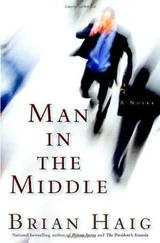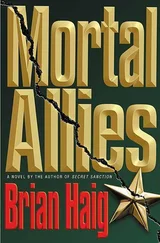“Tough question.” She paused for a moment. “All the Wall Street firms are loaded with Ivy studs. But Jack was always pretty close with Lew Wallerman. I think they knew each other before.”
Morgan thanked her, then walked out and closed the door quietly behind him. He stopped for a moment on the porch, withdrew the copy of Primo’s personnel chart, and began running his finger down the page, scanning for Wallerman.
The thirtieth line down, there he was, listed as working in wealth management, just like Jack.
“You’re Charles, and I got you,” he said out loud, and laughed.
By the second week of January, polymer-coated vehicles of all sorts were flying off the line. Humvees, Bradleys, M1 tanks, even the newest addition to the combat fleet, the Stryker, were lined up bumper-to-bumper to get a lifesaving face-lift. Fights broke out between the crews as they jockeyed to be next in line; the alternative was a long wait in a country where bombing had become the national sport.
FOB Falcon; Camp Graceland; Rasheed Airbase; Camp Cuervo; Engineer Base Anvil; Camp Whitford; Camp Whitehouse, FOB Rustamiyah, Baghdad-all had painting facilities that were beehives of activity. Converting the same crews who had been armor-plating the vehicles into painting teams proved to be kid’s play.
Even after spreading the chemical production around five different facilities located in five different states, the frenetic effort to supply sufficient quantities of the polymer fell abysmally short. Five or six large batches arrived in Iraq improperly mixed and had to be dumped, late at night, into nearby Iraqi rivers. Every other day, it seemed, the painting in Iraq ground to a halt. Quality control was another problem. Complaints poured back to the Pentagon about slipped schedules, shoddy workmanship, and the slapdash, miserably managed nature of the entire operation.
The leaders of CG weathered the storm of criticism the same way they had withstood the old chorus of complaints about its uparmoring program, a program that had also experienced notable problems. They ignored it. Frankly, it came as little surprise. The same inept managers oversaw the polymer application, the same lackadaisical crews worked three-hour shifts, stole off for long lunch breaks, and retreated to their air-conditioned trailers by three every afternoon for prolonged happy hours.
CG fell back on the tried-and-tested excuse that it was hard to hire good people for long-term duty in a scary war zone. What they wouldn’t admit was the bigger truth: in an effort to pump up profits, at the pitiful wages they were offering, nobody with half a brain would consider working for CG in Iraq.
After a while, once the noise grew too loud, CG shipped over a few new bodies and added night crews who quickly adopted the local work habits and managed to produce only a minor improvement.
But the results were spectacular, if you ignored the occasional blemish. In the first month, out of twenty attacks, only three coated vehicles were destroyed by roadside bombs. In each case, as investigations later revealed, the cause was faulty workmanship; CG’s coating crews had somehow, incredibly, overlooked the need to paint the whole vehicle.
To manage the finances of this exploding new company, CG assigned a veteran CFO, a carefully chosen executive well seasoned in defense contracts, who promptly handpicked a team of cutthroats with similar backgrounds. Military contracting officials were notoriously overworked and outnumbered, and often were far less skilled than their private-sector counterparts. CG’s team knew all the tricks, and took them to the max.
They padded the hours, added hundreds of ghost workers on the ground, jacked the cost of materials and production facilities through the ceiling, and double-billed as often as they thought they could get away with. And why not? The risks were almost inconsequential; in the unlikely event they were caught, a light slap on the wrist was the worst they could expect. The polymer was far too vital for the Pentagon to even consider anything as drastic as a punitive cancellation.
But if the incredible happened, and the Pentagon caught on, CG would express contrition, reassign its managers, pay a small penalty, and bring in a new team of clever shysters who would start over with the same tricks.
Eva continued to drop in at Jack’s like clockwork, every week. Their relationship seemed to be going nowhere fast, but she persisted. After all these months, they still hadn’t slept together, still hadn’t shared anything more passionate than a breezy peck on the cheek.
Jack’s visits to D.C. had tapered off to a predictable routine. Once a week, he made a quick drop-by visit to his small office in CG’s headquarters to make the rounds and get updates on the polymer. Even those trips had turned into a waste of his time. The executives who had been so open and communicative in the early stages seemed to have developed collective lockjaw. Nobody would admit it, but somebody had put out the word to ignore him.
A month before, Mitch Walters had coldly informed him of a new requirement: if he wanted to meet with the CEO, an appointment booked at least two weeks in advance was required. No problem, fine by him, Jack replied.
He had yet to call for an appointment. For over a month, he had not spoken with either Bellweather or Walters. They could cold-shoulder and shove him aside as much as they liked, as far as Jack was concerned; he had something they couldn’t ignore in that big contract, after all.
He owned a quarter of the polymer and its earnings.
By the way the cherry red Camry corkscrewed into Jack’s driveway, mowing down three bushes before it squealed to a grinding stop, the TFAC watcher wondered whether she was drunk, furious, or both. After five months of observing Jack’s home the watcher couldn’t wait for this job to end. He was bored and miserable. The excitement Eva’s visits once prompted was a thing of the past. The betting game had long since been discarded; there were no longer any odds on whether Jack and Eva would or wouldn’t.
Jack, for whatever reason-and many had been deliciously debated over the months-simply had no intention of letting Eva into his sack.
They admired his humbling willpower, and detested his indifference.
The TFAC man watched Eva stumble out the car and weave her way precariously to Jack’s front door. “She’s both,” he blurted into the microphone connecting him to the man parked in the van at the end of the block.
“What are you talking about?”
“Eva. She’s back, rotten drunk, and pissed enough to throw a punch. Old Jack’s about to get an earful.” He rolled down his window and listened. What fun. He was parked nearby, across the street, in the driveway of a young couple who were off on a European safari for a month. He could hear everything.
Eva pounded loudly on Jack’s door and stood there, swaying back and forth. “Jack, you bastard, come to the door. Come on, open up, I know you’re there.” She was bellowing loud enough for the whole neighborhood to hear, nearly the whole county. Lights began popping on in bedrooms. A few faces crowded up to windows.
After about a minute of her hollering and banging, the door opened. Jack stood there in his bathrobe. He invited her inside but she refused. “I’d rather have it out, here, buster. I want the whole neighborhood to hear this,” she announced at the top of her lungs. She was definitely getting her wish.
“If that’s what you want, fine,” Jack said, remarkably smooth and patient. He crossed his arms and leaned against the doorjamb. “What’s this about, Eva? What’s the matter?”
“You just shut up, ’cause this is my show. I’ll do the asking.” Her speech was slurred; the s’s came out with h’s, and the t’s virtually disappeared. She was totally, utterly smashed.
Читать дальше












